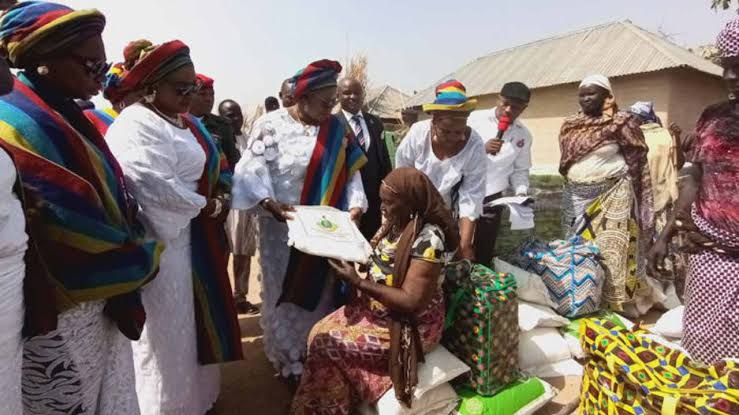Items donated include 50 cartons of Indomie, five gallons of 25 litres of groundnut oil, 20 cartons of detergent, 10 cartons of washing soap, 11 cartons of baby food, 21 cartons of baby milk and 20 packs of baby diaper.

Others are five bags of corn, two bags of sugar, 10 cartons of milk, 10 cartons of Bournvita and Milo, five bags of beans, 20 packs of spaghetti, 10 cartons of JIK and five cartons of Izal/Dettol.
Also, items donated include 20 bags of Semovita, six cartons of Haze odour control, five cartons of bathing soap and one carton of Vaseline.
Balogun said the visit was part of DEPOWA’s commitment to continue to provide succour to the less privilege in the society.
She commended the coordinator and staff of the facility for their sacrifices to humanity, adding that the objectives of DEPOWA would continue to support them.
“It is on this premise that we are here today to associate with the occupants of this establishment so as to give them a sense of belonging in our own little way by providing some humanitarian gift.
“We promise to continue to do our best at all times towards assisting the society within the limit of our resources whenever the need arises,” she said.
The Coordinator of the home, Mr Stephen Olusola, said the foundation was established following the discovery of certain cultural practices among the Bassa Komo tribe of FCT.
Olusola disclosed that he discovered while on missionary activities that certain categories of children were killed due to the cultural belief.
He stated that for the people, it was an evil thing to give birth to twins or triplet among them.
According to him, it is also evil for a mother to die while the child is still breastfeeding.
The attributes the nursing mother’s death to the child.
“By 1996 when we discovered this, we started pleading for these children that instead of killing them that they should let us have them.
“So, by 1996 we picked our first child in this community in Kiyi.
“Then we felt that it is an isolated case and by the time we started going to Abaji, Kwali, Kuje, Gwagwalada and the entire councils of FCT, we discovered additional 66 villages making a total of 67 villages that are involved in this practice.
“So, we started picking the children one after the other and as at today, we have a total of 157 children.
“Among them, we have 13 sets of twins and a set of triplet and we have several children who have been taken from that practice of burying a child with the dead mother which is the practice that gives us the highest number of children,” he said.
Olusola disclosed that their activities drew the attention of the FCT administration which invested and discovered that the story was true, adding that the foundation had attracted both local and global attention.
The uniqueness of the home according to him is that parents and communities of the children are known and their parents know them, adding that the children are not available for adoption.
“That is why we don’t give them out for adoption because we believe that in the nearest future we will return them back to these communities.
“In 2014, we had advocacy with amnesty international targeting few communities in Kwali Area Council and thank God that thing worked.
“By the grace of God today, out of those 67 communities, 10 of the communities have stopped the killing of children and today we now have twin and triplet children being born and living.
“Recently, we launched a programme sponsored by European Union commission in Nigeria run by Vine Heritage Home and ActionAid Nigeria.
“We want to target the remaining 57 communities and see if what we have done could also be applicable and stop the total killing of children.”

